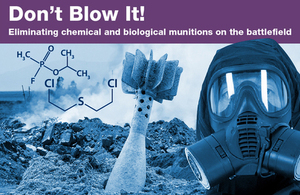New competition: 'Don't Blow It! Safely eliminating munitions on the battlefield'
The Defence and Security Accelerator (DASA) is launching a competition 'Safely eliminating chemical and biological munitions on the battlefield 'Don't Blow It!'

A gas mask behind a mound of rubble with chemical data
The Defence and Security Accelerator (DASA) is launching a new competition aimed at the private sector and academia, to seek innovative solutions and approaches to accessing, disabling and/or irreversibly destroying chemical and biological weapons munitions, improvised explosive devices (IEDs) and bulk agents on the battlefield.
The competition is aimed an non-traditional defence and security innovators. DASA will be particularly interested to hear from those in allied technology areas such as the oil and gas, mining sectors as well as those which have experience in handling hazardous materials.
With an initial £500,000 to fund multiple proof-of-concept proposals at low Technology Readiness Levels (TRL), it is anticipated that an additional funding of £1.5 million may be available depending on the outcome of the initial funding phase.
It is joint funded by the UK Ministry of Defence and the US Department of Defense, and will operate under an existing memorandum of understanding between both nations.
The competition was formally launched at an event in London on 26 September 2018.
Registration for this event has now closed, however, if you wish to attend please email accelerator@dstl.gov.uk and we will endeavor to add you to the delegates list for the day. Places are limited and we reserve the right to limit attendance if needed. If you are accepted to attend the event, you will be sent full details and an agenda.
Competition Summary Document
Details about the competition can be found here
Any queries regarding this competition, should be sent to accelerator@dstl.gov.uk.